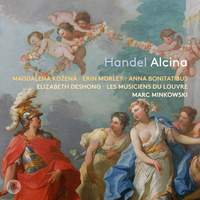Recording of the Week,
Handel's Alcina from Marc Minkowski
Based on an episode from Ariosto’s epic poem Orlando furioso (which also inspired Handel in Orlando and Ariodante), Alcina centres on the eponymous sorceress’s efforts to retain the affections of the bewitched knight Ruggiero, his intrepid fiancée Bradamante’s rescue-mission to Alcina’s enchanted island, and the complications which ensue when Alcina’s sister Morgana falls in love with the disguised Bradamante’s male alter ego ‘Ricciardo’. (No synopsis of this rather convoluted plot in the booklet, although a full libretto and translations are provided).
The four female voices on this recording deliver some of the most stylish and exhilarating Handel singing you’re likely to hear in one place today: each of them turns in at least one aria so dazzling that I had to stop and replay it multiple times when the recording first landed (adding a good forty-five minutes to an opera that already clocks in at over three hours). The three mezzos are beautifully contrasted, which not only makes the Act Three trio an absolute tour de force but also provides welcome dramatic clarity during the long recitatives: no need to stay glued to your libretto to stay up-to-speed on who’s singing what here.
Erin Morley’s diamond-bright soprano quite literally sets the bar high with her first aria, as Morgana is struck by Cupid’s arrow on meeting ‘Ricciardo’: pin-prick staccatos mimicking the pangs of love are despatched with crystal-clear accuracy, and her stratospheric ornamentation in the da capo feels fully rooted in the drama. (This turns out to be a hallmark of the recording as a whole – all seven soloists deliver lavish embellishments when the opportunity presents itself, but none of it feels like superficial showboating).
As the object of Morgana’s misguided affections, American mezzo Elizabeth DeShong (a criminally under-recorded singer) almost steals the show: the colour, weight and agility of the voice recall the late lamented Ewa Podleś, and her ability to manoeuvre in and out of chest-voice whilst despatching Bradamante’s awkwardly-written coloratura at breakneck speed is a marvel. (Try her furious ‘Vorrei vendicarmi’ for size and you’ll see what I mean).
Anna Bonitatibus’s lighter, brighter mezzo glows gently in Ruggiero’s evergreen ‘Verdi prati’ and also packs a real punch in the martial showstopper ‘Stà nell’Ircana’, sparring delightfully with the raucous pair of horns as the young knight strides forth to death or glory after the scales fall from his eyes. The only native Italian-speaker among the women, she also wrings every last drop of drama from the secco recitatives, particularly in her Act Three confrontation with her erstwhile enchantress.
But at the heart of it all is Kožená, at the height of her powers as a vocal actress and fully at ease with the tessitura of a role usually assigned to sopranos (Joyce DiDonato on Alan Curtis’s 2009 recording being a notable exception). She charts Alcina’s psychological journey quite magnificently, from the complacent, almost jaded sensuality of her opening scene to the ‘pangs of despis’d love’ which she experiences in the second half of the opera. It could be the best thing she’s done on disc yet.
Alex Rosen’s authoritative Melisso aside, the men aren’t quite on the same level as their female counterparts: as Morgana’s discarded lover Oronte and lost boy Oberto, both Valerio Contaldo and Alois Mühlbacher have a distinct edge to their tone which might grate on some listeners after three hours, though neither is any slouch in the flexibility department. And Minkowski shapes and shades everything to perfection, maintaining a welcome forward momentum in the recitatives and summoning some scintillating special effects to bring this 'isle full of noises' to life. All in all, this could well be a new reference recording for this rich and strange opera.
Magdalena Kožená (Alcina), Anna Bonitatibus (Ruggiero), Erin Morley (Morgana), Elizabeth DeShong (Bradamante), Alois Mühlbacher (Oberto), Alex Rosen (Melisso), Valerio Contaldo (Oronte)
Les Musiciens du Louvre, Marc Minkowski
Available Formats: 3 CDs, MP3, FLAC, Hi-Res FLAC




